Mountain Parkway Byway | |
|---|---|
| Route information | |
| Maintained by WVDOH | |
| Length | 9.8 mi[1] (15.8 km) |
| Existed | August 2, 1999–present |
| Major junctions | |
| South end | Intersection of WV 20 and Hodam Creek Road (CR 20/18) |
| North end | Upshur–Webster county line at Cleveland |
| Location | |
| Country | United States |
| State | West Virginia |
| Highway system | |
The Mountain Parkway Byway and Mountain Parkway Backway are two routes in northern Webster County, West Virginia. The Byway is a state-designated scenic byway which follows West Virginia Route 20 for 9.8 miles (15.8 km), traversing the headwaters of several mountain streams including the Right Fork Little Kanawha River, Jerry Run, and the Left and Laurel Forks of Holly River.[2][3][4][1][5][6] The Backway explores backroads in the same area, is 32 miles (51 km) long, and follows stretches of the Right Fork Little Kanawha River and Left Fork Holly River for portions of its route.[2][7]
Mountain Parkway Byway[edit]

Heading southbound on WV 20, the Byway begins after crossing the Right Fork Little Kanawha River into Webster County. A visitor kiosk is located just south of the county line. From there, visitors can follow WV 20 southbound to see the following sites in sequential order:
Cleveland[edit]
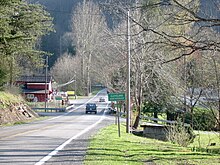
The northernmost village in Webster County, Cleveland was settled in 1844 by Robert McCray Sr. Previously named as Buffalo Fork and Point, it was renamed in honor of President Grover Cleveland in 1885. A post office operated here from 1853–1865 and 1883-1995.[8]
Jerry Run Summer Theater[edit]
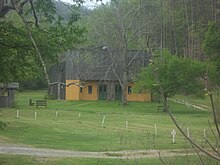
Located along West Virginia Route 20 is the Jerry Run Summer Theater. A large wooden structure containing a stage, snack bar and other amenities. It has seating for 150 people. Live Bluegrass, country, folk and gospel bands appear weekly on Friday or Saturday evenings from May through early October. The theater is owned by area residents Dusty and Renee Anderson.[9]
Sharon[edit]

At Jerry Run is the site of the Sharon post office that served the Jerry Run community from 1890 to 1900. Dr. William W. Hutchinson served two terms as postmaster. Patrick W. Bruffey, another early resident, was postmaster a short while, after having served as superintendent of Webster County Schools.[10]
Old Sulphur Spring[edit]

Located at Jerry Run is the Old Sulphur Spring. During the late 19th and early 20th centuries, the spring provided water for the travelers and the nearby Jerry Run one-room school. It is a favorite gathering site for locals in the community.[8]
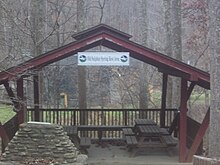
Located near the spring are a shelter, picnic table, and stone fireplace. This shelter is being used as a rest stop along the Mountain Parkway Byway.[10]
Hacker Valley[edit]
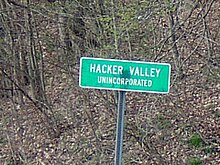
The village of Hacker Valley was named in honor of John Hacker. Hacker reportedly took possession of a tract of land nearby by "tomahawk mark" around 1772. A post office operated from 1856-1892 as Hacker's Valley.[11]
Holly River State Park[edit]

Situated along Laurel Fork is Holly River State Park, the second-largest state park in West Virginia at 8,294 acres (34 km2).[12] The park is known for its mountainous setting and contains several waterfalls. Other recreational activities such as camping, picnicking, and swimming is also possible in the park.
Mountain Parkway Backway[edit]
Mountain Parkway Backway | |
|---|---|
| Location | Junction of WV 20 and Replete Road (CR 3) to junction of WV 20 and Boggs Mill Road (CR 1) |
| Length | 32 mi[3] (51 km) |
| Existed | August 2, 1999–present |

The Mountain Parkway Backway follows lesser traveled routes in the area while paralleling stretches of the Right Fork Little Kanawha River and Left Fork Holly River. From along WV 20 near Cleveland, visitors can follow County Routes 1 (Boggs Mills Road), 1/1 (Three Lick Run Road), 6 (Westbrook Lane), and 3 (Replete Road) in a 32-mile (51 km) circuit that ends back at WV 20 south of Holly River State Park.[13][14] Travelers should be aware that many of the Backway roads are gravel.[15]
Several additional spurs leading from the Backway mainline also provide access to notable areas sites:[14]
- County Route 4 (Williams Camp Run Road) begins at its intersection with County Route 1. It leads to the Johnson Home.
- County Route 8 (Poling Road) branches off CR 3 and takes travelers to the Mollohan Mill.
- County Route 3/8 (Cowger Hill Road) travels west from CR 3 to Long Run Farm.
- County Route 20/2 (Mount Zion Road) serves as a connector between CR 3 and WV 20.
Boggs Mill Stone[edit]

Along Webster County Route 1, a large rock remains that Andrew Boggs reportedly moved from across Right Fork Little Kanawha River to his mill site in the late 19th century.[16]
Boggs was a gunsmith and is also remembered throughout the area for his extraordinary physical strength.[16] Boggs was the first to be buried on top of a hill east of the millstone. The cemetery is known as the Boggs Cemetery. The story is told that during the Civil War, Andy, who was sympathetic to the Confederacy, hid from the Yankees on that hilltop. He is said to have remarked, "It is so high and rugged that if one could escape the Yankees, surely it would provide a good place to hide from the devil."[16]
Johnson Home[edit]

The Johnson home, constructed in 1887 by John Nathaniel "Squire" Johnson, is a well-preserved example of 19th-century architecture. Johnson was a carpenter and built some of the one-room schools of the area. As of 2003, the home continued to be owned by the Johnson family.[17]
Mollohan Mill[edit]
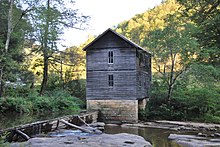
Bernard Mollohan constructed this mill on the Left Fork Holly River in 1894.[18] Operated until damaged by a flood in 1951, the mill was said to be one of the most prosperous area enterprises.[19]
The mill continues to be owned by the same family today through his great-granddaughter, Beth Mollohan. It is unusual in that the water wheel is horizontal to the water rather than vertical. The mill was listed on the National Register of Historic Places on September 2, 1982, the first such listing in Webster County.[20]
Hanging Rock[edit]

Just east of Poling is a large rock formation referred to locally as "Hanging Rock." The cliff extends out over and along Replete Road for several hundred feet. Formed of sandstone, the rock was deposited around 313 million years ago and undercut by water erosion from the adjacent Left Fork Holly River.[21]
The cliff extends out over and along Webster Co Rt 3 for 100 feet or more. Many years ago the rocks were used by pedestrians on horseback as a shelter in bad weather. Because of its uniqueness and beauty, the rocks has been the site of an occasional wedding.[22]
Mount Zion Church[edit]
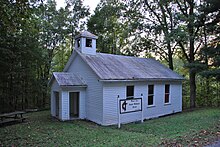
Location at the intersection of Replete and Mount Zion Roads, Mount Zion Church sits on a small bluff several hundred feet above Left Fork Holly River. The church was first erected in 1892 but subsequently destroyed by a 1932 windstorm. Material salvaged from the original building was used to build the current structure in 1933.[23]
Lowther Store[edit]

The store, now known as Lowther Store, was established in 1900 by John A. Hinkle. It is the oldest continuously operating store in Webster County and was listed on the National Register of Historic Places on April 7, 1997.[20][24] A post office operated at the store from 1903 until at least 1952.[25]
Wheeler Overlook[edit]
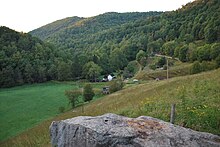
Along the Mountain Parkway Backway is the small village of Wheeler, named after Galloway Wheeler. The Wheeler Overlook provides a panoramic view of the village of Wheeler. In the early 20th century, Wheeler was the hub of the area containing a store, post office, grist mill, jewelry repair, and photograph shop.
Long Run Farm[edit]

Located at the base of Cowger Hill, the Long Run Farm apple orchard serves as the western end of an unsigned Backway Spur along County Route 3/8 (Cowger Hill Road).
Pugh[edit]

This is the site of the former Pugh post office (1888–1911) and the Wesley Anderson Store and Grist Mill. Anderson's home and store building are still standing.[26]
A 1906 invoice from the Wesley Anderson Store shows the store carried all kinds of merchandise. The invoice lists the materials for burial purposes and one coffin for a child at $6.45[10] (equivalent to $219 in 2023[27]).
Visitor kiosks[edit]
Three information kiosks have been built along the Mountain Parkway Byway and Backway to guide travelers:
Major intersections[edit]
The two routes are entirely in Webster County, West Virginia.
| Location | mi[1] | km | Destinations | Notes | |
|---|---|---|---|---|---|
| Hacker Valley | 0 | 0.0 | Southern terminus of the Mountain Parkway Byway | ||
| 1.2 | 1.9 | Southern terminus of the Mountain Parkway Backway | |||
| Cleveland | 8.1 | 13.0 | Northern terminus of the Mountain Parkway Backway | ||
| 9.8 | 15.8 | Northern terminus of the Mountain Parkway Byway | |||
| 1.000 mi = 1.609 km; 1.000 km = 0.621 mi | |||||
See also[edit]
References[edit]
- ^ a b c Google (January 2, 2017). "Mountain Parkway Byway" (Map). Google Maps. Google. Retrieved January 2, 2017.
- ^ a b "Byways". West Virginia Department of Commerce. Archived from the original on December 20, 2015. Retrieved December 20, 2015.
- ^ a b Northern Webster Co Improvement Council Inc. "West Virginia Mountain Parkway". Northern Webster County Improvement Council. Retrieved October 24, 2015.
- ^ "USGS Map Locator and Downloader". United States Geological Survey. Retrieved January 4, 2017.
- ^ Microsoft; Nokia (January 4, 2017). "Mountain Parkway Byway" (Map). Bing Maps. Microsoft. Retrieved January 4, 2017.
- ^ United States Geological Survey (1967). Hacker Valley, West Virginia quadrangle (Map). 1:24,000. 7.5-Minute Series (Topographic). Reston, VA: United States Geological Survey.
- ^ "Mountain Parkway Byway and Backway". Webster County Tourism. Archived from the original on December 30, 2016. Retrieved December 29, 2016.
- ^ a b "Webster County". West Virginia Highway Markers Database. West Virginia Division of Culture and History. Retrieved September 18, 2010.
- ^ "Jerry Run Summer Theater". Retrieved January 24, 2010.
- ^ a b c Northern Webster Co Improvement Council. "Historic Places on the Mountain Parkway". Retrieved October 24, 2015.
- ^ Virgil, Lucullus; McWhorter, William Elsey; Connelley, John (2010) [1915]. The Border Settlers of Northwestern Virginia from 1768 to 1795: Embracing ... Cornell, NY: Cornell University Library. pp. 82–84. ISBN 978-1-112-58955-3 – via Google Books.
- ^ "Facilities Grid" (PDF). West Virginia State Parks. March 29, 2008. Archived from the original (PDF) on February 5, 2009. Retrieved February 5, 2010.
- ^ Google (January 23, 2010). "Mountain Parkway Backway Mainline" (Map). Google Maps. Google. Retrieved January 23, 2010.
- ^ a b West Virginia Department of Commerce. Mountain Parkway Backway and Byway Map (Map). Charleston: West Virginia Department of Commerce. Retrieved January 24, 2010.
- ^ West Virginia Department of Transportation (2011). General Highway Map: Webster County, West Virginia (Map). Charleston: West Virginia Department of Transportation.[full citation needed]
- ^ a b c Feather, Carl E. (1998). Mountain people in a flat land: a popular history of Appalachian migration to northeast Ohio, 1940-1965. Athens: Ohio University Press. p. 55. ISBN 9780821412299. Retrieved February 5, 2010 – via Google Books.[full citation needed]
- ^ Johnson Home (Historical marker). Wheeler, WV: Northern Webster County Improvement Council. 2003. Retrieved September 12, 2010.
- ^ Pauley, Michael J.; Richardson, Neil (July 1, 1982). "National Register of Historic Places Nomination: Mollohan Mill" (PDF). Charleston: West Virginia Department of Culture and History. Retrieved January 24, 2010.
- ^ Mollohan Mill (Historical marker). Wheeler, WV: Northern Webster County Improvement Council. Retrieved September 12, 2010.
- ^ a b "National Register Information System". National Register of Historic Places. National Park Service. April 24, 2008.
- ^ Hanging Rock (Historical marker). Wheeler, WV: Northern Webster County Improvement Council. 2003. Retrieved September 12, 2010.
- ^ "Scenic Locations". Northern Webster County Improvement. Retrieved December 12, 2016.
- ^ Mount Zion Church (Historical marker). Wheeler, WV: Northern Webster County Improvement Council. 2003. Retrieved September 12, 2010.
- ^ Lowther, Linda (November 14, 1996). "National Register of Historic Places Nomination: Lowther Store" (PDF). Hacker Valley, WV. Retrieved January 24, 2010.
- ^ Wheeler (Historical marker). Wheeler, WV: Northern Webster County Improvement Council. Retrieved September 12, 2010.
- ^ Pugh (Historical marker). Wheeler, WV: Northern Webster County Improvement Council. 2003. Retrieved September 12, 2010.
- ^ 1634–1699: McCusker, J. J. (1997). How Much Is That in Real Money? A Historical Price Index for Use as a Deflator of Money Values in the Economy of the United States: Addenda et Corrigenda (PDF). American Antiquarian Society. 1700–1799: McCusker, J. J. (1992). How Much Is That in Real Money? A Historical Price Index for Use as a Deflator of Money Values in the Economy of the United States (PDF). American Antiquarian Society. 1800–present: Federal Reserve Bank of Minneapolis. "Consumer Price Index (estimate) 1800–". Retrieved February 29, 2024.


